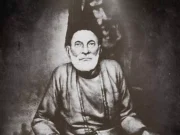
Alankrita Shrivastava returns to Zoya Akhtar territory in Bombay Begums, armed with Rahul Bose and an overwritten voiceover. Wives are at war with husbands, teenagers at war with their mothers, and women at war with other women in the six-part Netflix drama, starring Pooja Bhatt, Shahana Goswami, Amruta Subhash, and Plabita Borthakur as four women trapped in the snake-pit of corporate India. Aadhya Anand, meanwhile, plays an emo teen named Shai, who provides the navel-gazing narration.
While the show’s ‘smash the patriarchy’ spirit might feel progressive to some, Shrivastava’s sensibilities as a storyteller, remain, as always, strictly Bollywood. There is little room for subtlety in Bombay Begums, as can immediately be gathered from the episode titles that have been lifted from feminist literature, and plot lines that involve the emancipation of a sex worker and the importance of upholding traditions such as Karwa Chauth.
While these contradictions may sound odd — can a show claim to be feminist when it has a female character dismiss the surrogate mother of her unborn child as ‘just a womb’? — but they bring a certain realism to these women that is uncommon in an industry that largely prefers putting them inside clearly labeled boxes.
Bombay Begums’ strength lies in its characters, each of whom embodies the clashing morals and ideologies of the show itself — in one moment they’re pulling each other down, and in the next, making uplifting speeches about sticking it to the man. You’re never quite sure whether or not any of them is a decent person, but expecting them to be ‘polite and agreeable’, as Jane Austen would say, reveals the sort of indoctrination that we’ve grown to accept.
We watch Rani (Pooja Bhatt), the CEO of a private bank, go to great lengths to brush serious problems under the carpet, often through illegal means. We witness Fatima (Shahana Goswami), Rani’s number two at the bank, bend over backwards to fulfil the desires of her husband, who’s jealous of her professional success. We don’t know how to feel about Lily, the one-time bar-dancer played by Amruta Subhash, as she scams her way to a better life, for herself and her son. And we relate with Ayesha (Plabita Borthakur), who must learn to navigate life as a small-town girl in a big bad world, and at the same time try and comprehend her dormant desires as a bisexual woman.
As rebellious as they may be, these women are all wired to accept the unwritten laws of a patriarchal society. It would be unfair (and not to mention unrealistic) to expect them to be some sort of mascot for female freedom. They are, however, constantly striving for it, in their own messy ways.
Naming Pooja Bhatt’s character Rani doesn’t seem like an arbitrary decision. It’s a truly layered performance — she is regal on the outside, but vulnerable underneath her spectacular saris. Like the show, flawed as it is, you can’t help but engage with its characters, damaged as they are.
Despite the title, though, Bombay Begums could’ve just as easily been set in any tier one Indian city. Besides random transition shots of Mumbai and the occasional establishing shot of Lily’s chawl, the show is predominantly set indoors — inside unremarkable boardrooms, generic offices, and upper middle-class homes — with little to suggest that it takes place in the City of Dreams.
There are some undeniably complex ideas at play here, such as the complicity of women in upholding the honour of toxic men. But the show takes a frank, on-the-nose approach to tackling this notion, similar to the film Bombshell. A more thoughtful attitude wouldn’t have hurt.
Ultimately, Bombay Begums isn’t a show about men and women; it’s a show about power, and the extent to which certain people are willing to go, regardless of their gender, to hold onto it. It isn’t an absolute train wreck like Shrivastava’s previous Netflix release, Dolly Kitty and Woh Chamakte Sitare — a superficial examination of serious issues — but there’s still an element of preachiness to the proceedings. It’s inelegant, but empowering in its own way.
Anupama Chopra’s review of Bombay Begums highlights Pooja Bhatt’s exceptional performance in a series that delves deep into the lives of five women navigating the complexities of desire, power, and identity in modern-day India. Alankrita Shrivastava, known for her bold narratives on women’s issues, directs this Netflix series, which has been praised for its strong performances, particularly Bhatt’s portrayal of a corporate leader balancing her personal and professional life. The series, while occasionally uneven, is noted for its empowering depiction of women challenging societal norms.







































